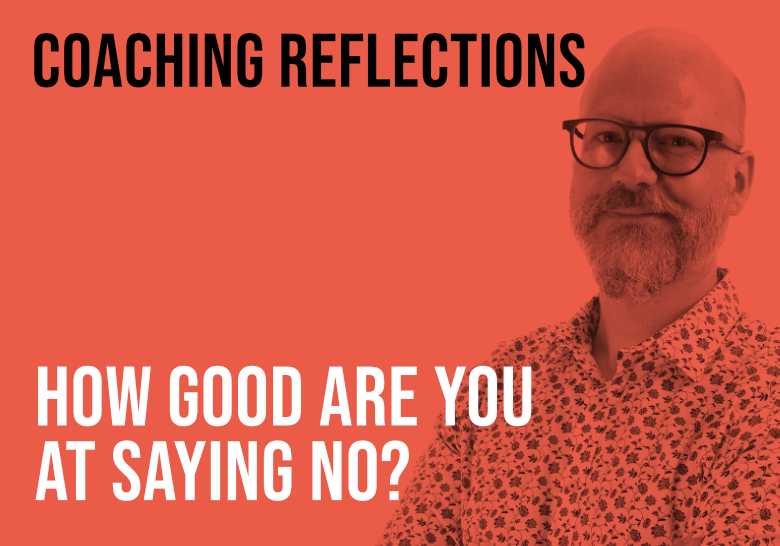If you’re a people pleaser or self-identified high achiever, how good are you at saying no? This is something that comes up all the time in my design leadership coaching practice and is the topic of this week’s coaching reflection.
Transcript
Introduction
[00:00:00] Andy Polaine: Are you a people pleaser? Self identified high achiever? How good are you at saying no?
My name’s Andy Polaine and every week I spend my days coaching design leaders and in these videos, I reflect upon the common themes and questions that come up in the week. And this week, I wanted to talk about a reframe of saying no.
Trouble saying no
I just came back from this Service Design Global Conference in Helsinki, which was wonderful. And I gave a talk around leadership and this idea of it’s not business, it’s personal because it’s always personal. There’s a lot of things I said, but one of the things that happened was a lot of people came up to me afterwards and said yes, but you know, one of the problems I really have saying no.
The no reframe
[00:00:36] Andy Polaine: And I want to give you a reframe around saying no. When someone comes to you, they’ve got something on their plate that they want to get off of their plate. They’re trying to get this thing done, and they want someone else to do it, or they need someone else to do it. At that moment in time, it is still their problem. As soon as you say, yes, I’ll do that. Then it becomes your problem.
If you know that you’re not going to be able to do it in time, or it’s going to be a struggle, or it’s going to be a stress. It’s much better to let someone down upfront and say no to them early while they still have time to do something about it. And secondly, while it’s still their problem. As soon as you take it on, if you let them down at the last minute and say, oh, sorry, I didn’t manage to do it. Well, now that problem is yours. And now you’re the one that looks flaky and it reflects badly on you.
If you say no upfront, and that person has left it too late because they haven’t planned properly or there aren’t enough resources, well, then that’s their problem. And that’s really, really important because it’s usually someone more senior or senior leadership saying on a Friday, this thing has to be done by Monday. To which the reasonable answer is, well, your lack of planning is not my emergency. Because the expectation then is that you’re going to be working your evenings and weekends to get it done.
Completing the feedback loop
[00:01:46] Andy Polaine: Saying no is a really important part of the feedback loop, that their ambitions are greater than their willingness to resource them. Or their need to have something done urgently is down to their lack of planning.
Now there are going to be moments where, of course you have crunch times and occasionally we will have to work weekends or you do something on the evening. But what I’m talking about is when that becomes the norm. And what you’ll end up doing then is you’re now working for free, for starters, you’re taking time away from your loved ones, but also, if you get it done, you’re actually reinforcing the poor behavior. Because then what happens is whoever gave you that task with an unreasonable deadline, sees that it worked. And probably thinks well next time you can do that quicker.
Saying no is being helpful
[00:02:24] Andy Polaine: So the reframe is saying no is actually helping people. You’re helping the organization get a more realistic idea of what they’re able to achieve instead of everyone running flat out and burning themselves out. And it’s obviously more useful for you because you’re not having that experience. And you’re not reinforcing bad behavior. There’s a lot I learned from training a dog.
Outro
[00:02:45] Andy Polaine: I hope that’s useful for you. If you’d like to check out my coaching practice, it is at polaine.com/coaching, and I’ll put the link below. If you’ve got any of your own tips about how you go about saying no and what’s worked for you. I’d love to hear them.
Thanks very much. I’ll see you again soon.


